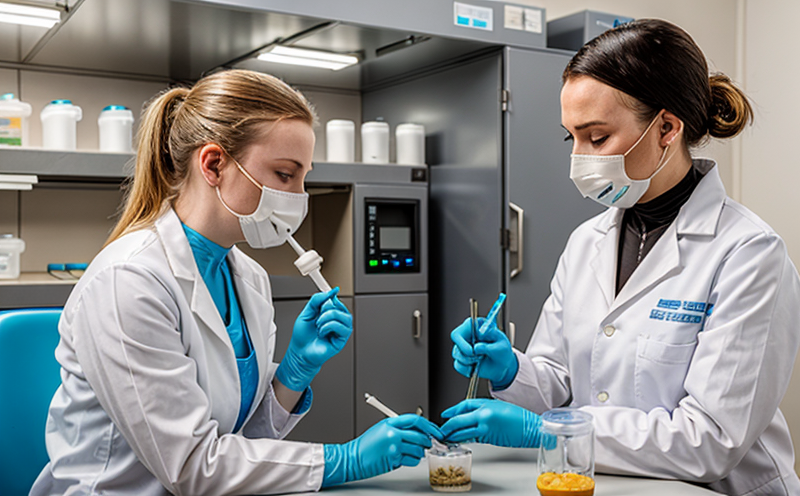ISO 59380 Aflatoxin Profiling in Pistachios and Almonds
The ISO 59380 standard provides a comprehensive approach to profiling aflatoxins, particularly relevant for pistachio and almond producers. This service ensures the safety of these nuts by identifying and quantifying various aflatoxins that can pose significant health risks if present in high concentrations.
Aflatoxin contamination is not only detrimental to human health but also leads to economic losses due to recalls, rejections, and reduced marketability. The ISO 59380 method allows for precise detection of aflatoxins B1, G1, M1, and other related compounds in pistachios and almonds. This service is critical for quality assurance, compliance with regulatory standards, and maintaining consumer trust.
The testing process involves several steps: sample collection, initial screening using rapid methods like ELISA or lateral flow assays, followed by confirmation through more sensitive techniques such as High Performance Liquid Chromatography (HPLC) coupled with Mass Spectrometry (MS). This dual approach ensures accuracy and reliability of the results.
Our laboratory adheres strictly to ISO 59380 guidelines. We ensure that all our equipment is calibrated regularly, and our technicians are trained according to international best practices. The method's robustness allows us to detect even trace amounts of aflatoxins, making it a reliable choice for ensuring the safety of your products.
The ISO 59380 standard also emphasizes the importance of sample preparation which includes proper grinding and homogenization to avoid sampling errors. This step is crucial as any miscalculation in sample size or handling can lead to inaccurate results. Our laboratory employs advanced techniques for sample preparation, ensuring that each sample analyzed represents a true reflection of the product.
Once the samples are prepared, they undergo extraction followed by cleanup if necessary before injection into the HPLC-MS system for analysis. This process ensures that only aflatoxins are detected and not other compounds present in the matrix which could interfere with the results.
The results from this profiling service provide detailed information about the types and levels of aflatoxins present in your product batches, helping you make informed decisions regarding quality control and compliance. By adhering to ISO 59380 standards, we help ensure that every batch of pistachios and almonds meets international safety and quality benchmarks.
Understanding the importance of this testing is crucial for food manufacturers who aim to protect their reputation and maintain consumer confidence. With our expertise in this field, you can rest assured that your products meet all necessary regulatory requirements and are safe for consumption.
The ISO 59380 method offers a systematic approach to aflatoxin profiling which includes sample preparation, extraction, cleanup, and analysis using HPLC-MS. This comprehensive methodology ensures accurate detection of aflatoxins B1, G1, M1, and other related compounds in pistachios and almonds.
By implementing this service into your quality control protocols, you demonstrate a commitment to food safety and regulatory compliance. Our team is dedicated to providing reliable results that help maintain the integrity and value of your products.
Industry Applications
| Application | Description |
|---|---|
| Pistachio Processing | The ISO 59380 method ensures that pistachios are free from harmful levels of aflatoxins, thereby enhancing food safety and compliance with international standards. |
| Almond Production | This service guarantees that almonds meet stringent quality controls and regulatory requirements, protecting both producers and consumers. |
| R&D in Food Safety | The method supports research aimed at developing safer food processing techniques and enhancing the shelf life of nuts by minimizing aflatoxin contamination risk. |
| Supply Chain Management | By using this service, companies can ensure that raw materials used in their products are safe, thus maintaining a robust supply chain. |
Why Choose This Test
The ISO 59380 aflatoxin profiling method stands out due to its precision and reliability. It offers detailed insights into the levels of various aflatoxins present in pistachios and almonds, providing critical data for decision-making processes within your organization.
Our service is chosen by many because it goes beyond basic detection; it provides comprehensive analysis that helps identify potential issues early on. This proactive approach ensures that any contamination can be addressed promptly before it affects the entire production cycle or supply chain.
The method's robustness allows for accurate quantification even at trace levels, ensuring that your products meet the highest safety standards. Compliance with international regulations is essential in today’s global market, and our service helps you stay ahead of these requirements.
In addition to meeting regulatory expectations, this testing supports internal quality assurance programs by offering detailed information about product consistency. This data can be used to refine processes continuously, leading to improved overall product quality over time.
Moreover, the ISO 59380 standard is widely recognized and respected globally. By choosing this service, you demonstrate your commitment to maintaining high standards of food safety and compliance with international norms.
The detailed reports generated from this method provide transparency in supply chains, helping build trust among stakeholders. This reliability enhances customer satisfaction while reducing the risk of recalls or other negative consequences associated with aflatoxin contamination.
International Acceptance and Recognition
- Aflatoxins B1, G1, M1: These are some of the most commonly detected aflatoxins in pistachios and almonds. They have been widely recognized by global health organizations as significant risks to human health.
- International Regulatory Compliance: Many countries require compliance with ISO 59380 for food safety, especially when exporting products internationally.
- Global Market Access: Meeting these standards opens up opportunities for export and enhances your product's reputation in international markets.
- Consumer Trust: Demonstrating adherence to stringent testing protocols builds trust with consumers who increasingly demand transparency regarding the safety of their food products.
- Competitive Advantage: Companies that implement ISO 59380 methods are seen as leaders in quality assurance, giving them a competitive edge over those who do not adhere to such rigorous standards.





